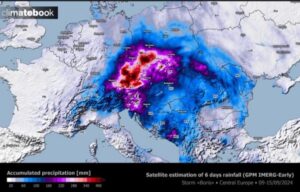Did they have weather in Galt’s Gulch? Or did John Galt’s command over the laws of nature, which allowed him to shield his personal mini-state from prying overflights, also extend to control over the winds and rain in the valley?
Atlas Shrugged is, of course, a fantasy, and it could be argued that a fantasy world is allowed to have fantasy weather. If, however, the fantasy has been created, as so many have been and Atlas Shrugged certainly was, to send a message, it is reasonable to demand a measure of reality. A message cannot be accepted if the conditions that are necessary to make it work in the real world donot exist. And the message of Atlas Shrugged is a very clear one; it does not have to be deduced because it is specifically stated. It is that the only roles that a government should play are the provision of an army, a police force and a judicial system. Weather and its consequences are not a concern of any of these.
We seem to have had rather a lot of weather this year. At the top end of the Adriatic, summers are expected to be hot, even if punctuated by the occasional cooling storm, and it is accepted that no serious work will be done in July and the early part of August. This year, however, the heat began well before the start of July and continued unpunctuated into early September. Only then did it rain. And rain it did, across the whole of central Europe.

The impact of Storm Boris, September 2024. As documented in Wikipedia, flooding began in Austria and the Czech Republic, then spread to Poland, Romania and Slovakia, and then onwards to Germany and Hungary. As of 28 September 2024, 27 fatalities had been reported.
Flooding is, of course, a perpetual menace not just to central Europe but to Europe as a whole. The heavy rains may tend to be concentrated in the mountainous central regions, but the water has to go somewhere. It flows down the great rivers and eventually into the sea, and on its way it wreaks havoc. In 1910 more than a thousand people died in the Kingdom of Hungary alone; the death toll over the entire continent is likely to have been more than twice that figure. By comparison, the twenty-seven flood-related fatalities reported as due to storm Boris in 2024, in a much more densely populated Europe, seem almost trivial. Why the difference?
Many reasons, one of the most important being that Europe knew it was coming, and was, to some extent prepared. The very vulnerable were moved out of danger in advance in many areas or readied for speedy evacuation if that became necessary. Flood defences were much better, and emergency services were better coordinated and had better equipment, including such things as helicopters, undreamed of in 1910, and much better road networks giving access to outlying areas. These things would have been either not have existed in a Randian state or, if thy did, would have been reserved for their own use, and the use of those who could pay them to use them, by the rugged individualists of Ayn Rand’s dream world. At best, the army and the police force might have mounted rescue operations, but their primary function in that world would have been the protection of private property from looters. The rescue of a family stranded on a rooftop and surrounded by rising flood waters would have been pure altruism and as such very much frowned upon, if not actually forbidden. Unless, of course, the family could pay.
In gold.
And what of the United States, Ayn Rand’s adopted homeland? On 26 September Hurricane Helene made landfall in the Florida panhandle, and was followed on 9 October by Hurricane Milton, hitting the central part of the state where Helene had had little impact. Neither was unexpected, both had been predicted and then tracked by the National Oceanic and Atmospheric Administration (NOAA)’s Climate Prediction Center, and preparations, including evacuations, had been implemented. Nonetheless, the death tolls were considerable, an estimated 231 for Helene and 24 for Milton. Following those storms, a hurricane of criticism descended on the federal government agencies.
This is not the place to argue about the extent to which any of those criticisms were justified.
But would there have even have been a federal government, if Ayn Rand had had her way?
